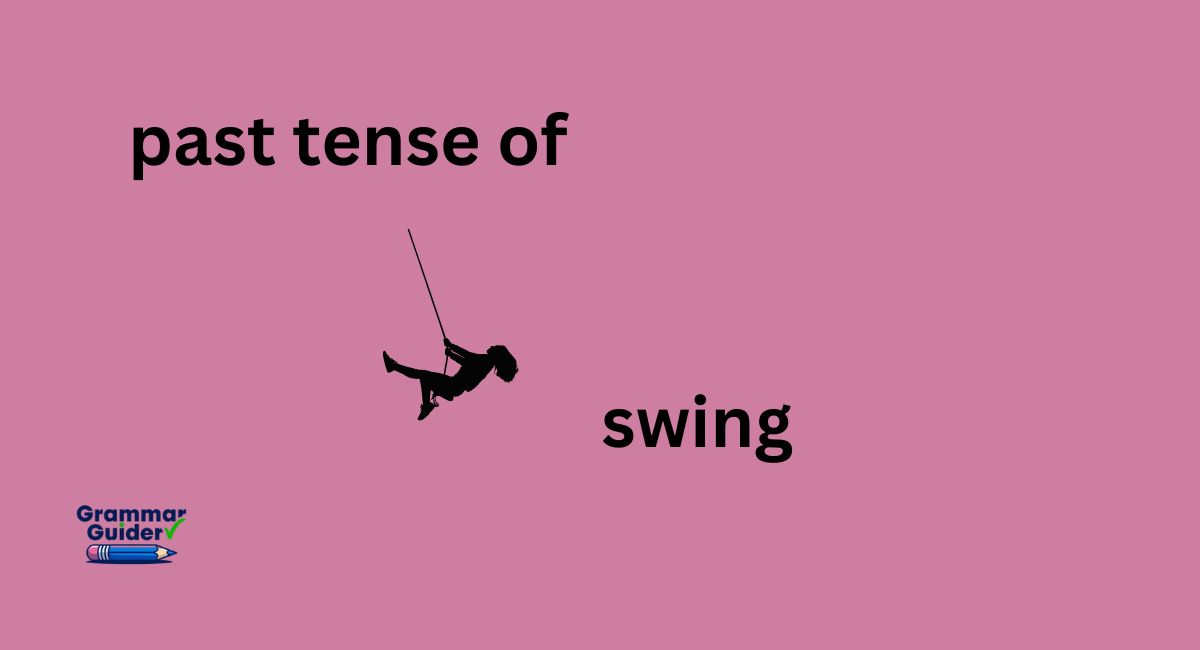The verb “swing” has a unique past tense. Many people wonder if it should be “swang” or “swung.” The correct past tense of “swing” is actually “swung.” This is because “swing” is an irregular verb that doesn’t follow the usual patterns.
Understanding irregular verbs can be tricky. Unlike regular verbs that simply add “-ed” to make the past tense, “swing” changes to “swung.” It is important to use “swung” when talking about past actions like swinging on a playground swing.
Swing, swang or swung?
The verb “swing” is often confusing when it comes to the past tense. Some people think the past tense is “swang”, but it is actually “swung”. Understanding the correct form helps us speak and write clearly.
In English “swing” is an irregular verb, which means its past tense does not follow the usual rules. Instead of adding “-ed” we use “swung”. Knowing this helps avoid mistakes when using the word in sentences about the past.
What’s the past tense of “swing”?
The past tense of the verb “swing” is “swung”. It does not follow the regular pattern where you add “-ed”. Instead, it has an irregular form in the past.
When you talk about something you did in the past like swinging on a swing, you use “swung.” For example, you might say, “Yesterday, I swung high on the swing.”
Why the past tense is “swung”?
The past tense of the verb “swing” is “swung” because it is an irregular verb. This means it does not follow the usual rule of adding -ed to form the past tense. Instead, swung is the correct form.
Irregular verbs like “swing” do not follow simple patterns in English grammar. The past tense of “swing” is “swung” because of its unique verb conjugation. Understanding this helps when using irregular verbs correctly in different sentences.
How to pronounce “swing” and “swung”
Pronouncing “swing” and “swung” is easy once you know the sounds. To say “swing,” start with an ‘s,’ followed by a short ‘i,’ then end with ‘ng.’ For “swung,” say “swuh-ng.”
Pronouncing “swing”
It is simple. Start with the “s” sound, followed by a short “i” like in “sit.” End with “ng,” similar to “bring.” The word sounds like “sw-ih-ng.” This clear pronunciation helps in saying the word correctly every time.
Pronouncing “swung”
It is simple once you understand the sounds. Start with the ‘sw’ sound followed by a soft ‘uh’ sound. Then say the ‘ng’ sound like in the word “ring.” Put it all together and you’ll have “swung.” Practicing these sounds will help you say the word clearly.
What does the word “swing” mean?
The word “swing” has different meanings depending on how it is used. It can refer to a rhythmic movement back and forth, like a pendulum. People often see this when children play on a playground swing, moving in the air.
It can also describe a change in direction or emotions. For example, someone’s mood might swing from happy to sad. The word can also describe the action of moving something forcefully, like when you swing a baseball bat.
A simple tense table
| Tense | Example Sentence |
|---|---|
| Present | I swing every day. |
| Past | I swung yesterday. |
| Future | I will swing tomorrow. |
| Present Continuous | I am swinging right now. |
| Past Continuous | I was swinging an hour ago. |
| Future Continuous | I will be swinging later. |
| Present Perfect | I have swung many times. |
| Past Perfect | I had swung before noon. |
| Future Perfect | I will have swung by 5 o’clock. |
| Present Perfect Continuous | I have been swinging all morning. |
| Past Perfect Continuous | I had been swinging for an hour. |
| Future Perfect Continuous | I will have been swinging for two hours. |
Origin of the word “swing”
The word “swing” comes from Old English, where it was spelled “swengan” or “swengen”. It meant to shake or move back and forth. This word evolved from the Proto-Germanic word “swengwan”, which also meant to shake or whip.
Over time, “swing” took on more meanings. It started to describe movements like the pendulum motion or the back-and-forth motion of things. Today, “swing” can mean many things, from playground swings to a change in mood or opinion.
Using “swing” and “swung” in sentences
“Swing” is used for present actions, like “I swing on the swings.” “Swung” is used for past actions, like “I swung yesterday.”
Using “swing” in a sentence:
- Children like to swing on the playground swings.
- The old wooden swing creaked in the breeze.
- I can swing my legs when I sit on a chair.
- She loves to swing on the tire swing in the yard.
- I will swing by the store later to buy some snacks.
- The swing of the pendulum in the clock was peaceful.
Using “swung” in a sentence:
- The athlete swung the bat and hit the ball far.
- We swung on the hammocks at the beach last summer.
- The pendulum of the clock swung back and forth all night.
- They swung their arms while walking down the path in the park.
- The chandelier in the room swung gently with the wind.
- The child swung the pinata-bat to break it open.
Synonyms of “swing” and “swung
Synonyms of “swing” and “swung” include words like sway, rock, oscillate, flutter, and swept, all describing similar movements.
Synonyms for “swing”
- Sway
- Rock
- Pendulum
- Swoop
- Oscillate
- Undulate
- Flutter
Synonyms for “swung”
- Swept
- Brandished
- Moved
- Swayed
- Flourished
- Wielded
- Held
FAQs
What is the past tense of “swing”?
The past tense of “swing” is “swung.” It does not follow the normal pattern of adding “-ed.”
Why is the past tense “swung” and not “swang”?
Swing” is an irregular verb, so its past tense is “swung” instead of “swang.”
Can we use “swang” as the past tense of “swing”?
No, “swang” is not correct. Always use “swung” when talking about the past.
How do we pronounce “swing” and “swung”?
Swing is pronounced like “sw-ih-ng” and “swung” is pronounced “swuh-ng.”
What does the word “swing” mean?
Swing” means to move back and forth. It can also describe a rhythmic movement or a change in ideas.
What are some **synonyms** for “swing”?
Some synonyms for “swing” include sway, rock, and oscillate.* They describe similar types of movement.
Conclusion
The past tense of “swing” is “swung”. Many people might think the past tense is “swang,” but this is not correct. In English, “swing” is an irregular verb, which means it doesn’t follow the usual rule of adding -ed to form the past tense. Instead, it changes to “swung” when talking about something that happened in the past. For example, “Yesterday, I swung on the swing at the park.”
It is important to remember that “swang” is not a correct form of the verb. Using “swung” will make your speech and writing sound proper. This rule applies whether you are talking about physical actions, like swinging on a swing, or more abstract actions, like a change in opinions. Always use “swung” when describing past events involving “swing”.

Jacob Harrison is the seasoned writer behind Grammar Insights, with over nine years of experience in the field. Passionate about language, he shares practical tips and strategies to help readers enhance their grammar and writing skills. With a friendly approach, Jacob makes learning accessible and enjoyable for everyone.

